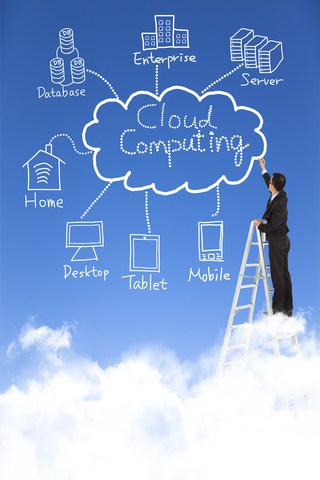What Is the Cloud?
Let’s talk about the Cloud. No, we don’t mean the fluffy white mass of condensed water vapor floating above us in the atmosphere. We’re talking about Cloud technology.
You’ve probably heard of it before. Perhaps you’re already using it. But what does it actually do? What does it mean when a company says they’re “cloud-based” or that they “store your information in the cloud”?
In this article, we’re going to put your head in the Cloud (sorry, we couldn’t resist!) and explore the advantages the Cloud has for your business.
In the sections following, we’ll talk about
- cloud computing,
- cloud storage,
- doing business in the cloud, and
- advantages for your business that you should expect from using cloud computing.
Cloud Computing
Cloud computing allows you to share software over a network. The term refers to the use of computing power that’s located in the Cloud of remote networks. The software doesn’t have to be stored or executed on your local network or drive, but instead executes on a remote server to which you connect over the Internet.
Cloud computing has opened doors for many businesses around the world. For example, Adobe launched it’s Creative Cloud product in 2013. Creative Cloud allows you to pay a subscription fee and access all of the Adobe Creative Suite programs, like Photoshop, Dreamweaver, Illustrator, and Premier Pro, over the Internet. Before the Cloud, you would’ve had to purchase disks or download the programs to your computer at a tremendous one-time cost in cash and time. With the software being in the cloud, Adobe can charge a more affordable monthly “rental”, and users can install on existing or loaner computers on the fly.
There are three key types of Cloud Computing services:
- Software as a Service (SaaS): Allows users to use an application or software without installing it on a computer (example: Salesforce)
- Platform as a Service: Allows third parties to build applications without buying hardware or maintaining software (AppEngine from Google)
- Infrastructure as a Service: Provides hardware capabilities to users to run their own software services (VoIP telephone providers)
Cloud Storage
Cloud storage simply means that data are stored on servers in large data centers instead of your computer’s hard drive. When you store data on your computer, that’s called local storage. You’re probably wondering, “how does my data get to these large data centers?” and the answer shouldn’t surprise you – the Internet!
Have you ever uploaded a file to Google Drive? If so, then you know that the file is saved to your Google account and is then accessible anywhere you have Internet access. This is an example of how the data is saved and accessed via the Cloud.
There are three different types of Cloud storage:
- Private: Only accessible to one user
- Public: Shared by multiple users
- Hybrid: A customized combination of shared and dedicated resource
- Community: Dedicated resource for a group of users
Many popular cloud storage programs like Box.com, Dropbox, and project management tools like Basecamp offer each of these capabilities in their service offerings. Dedicated backup services like Box.com and Mozy.com provide a desktop client that interfaces to and synchronizes with the cloud storage offered as part of the service.
Doing Business in the Cloud
The Cloud has not only changed the way we store data and access software programs, it’s also opened new doors for business telephone services. Many businesses are replacing their standard public switched telephone number (PSTN) system with an IP PBX for Voice over IP (VoIP) calling. Your VoIP service provider that provides your telephone service offers capabilities that replace all of the customary expensive PBX equipment needed for the PSTN. As a result, you only pay a monthly fee to access VoIP telephony services and messaging service through the Cloud.
A Cloud PBX will give you all of the advantages and functionality of an in-house phone system, like Auto Attendant, Call Recording, Sequential Ringing, and more. The cloud advantage is that you can configure all these features through a simple web interface.
Why Use the Cloud
By switching to the Cloud, you can reduce costs and increase flexibility, yet still keep your data secure.
Instead of investing in expensive hardware, software programs, and equipment that will require expensive upgrades and repairs, the Cloud gives you the ability to host and access all of this over the Internet. Flexibility isn’t an issue when you’re in the Cloud. Software and programs are accessible regardless of where you are, giving you and your employees the ability to work remotely around the world.
Studies show that Cloud usage among businesses is on the rise, and the market for Cloud services will be worth more than $106 billion dollars by the end of 2014. This means that new services and capabilities will be arriving on an ongoing basis in the lively market place. Cloud adopters will have many good alternatives from which to craft a best-case solution for their companies.

